- Products
- Solutions
- Services
- Resources
- Customer Success
- Company
- Sign In
- Contact Us

Digital Transformation enabler helping enterprises evolve by connecting technology
Take a look at upcoming webinars and special events
HokuApps news and media coverage
Be with the best. Solve real problems
Get in touch with our experts here
Explore our extensive collection of online resources here
Information and insight on transformation to the Digital Workplace
Quick Guides provide concise information on a variety of topics
Discover the essence of HokuApps’ products
Learn all about HokuApps’ cutting-edge enterprise mobility technology

On January 9, 2007, Apple CEO Steve Jobs took to the stage amid a roaring crowd in San Francisco, California to unveil the iPhone. That’s what started it all… our tryst with touchscreens, mobile apps, and digital media. And, there’s been no looking back.
A decade later, Apple launched the iPhone X, which has become a benchmark in design and features for smartphone manufacturers across the globe. Even as the markets get flooded with cheaper devices, Apple retains its premier positioning. And, so does the company’s App Store.
Over the years, the focus of iPhone app development may have shifted from trying to mesmerize users to offering innovative solutions that add significant value. The app space has matured, driven not just by individuals seeking greater convenience in their lives, but also by enterprises leaning on mobility for meeting their business goals. While the demand for iPhone app development services has soared, there’s an increasing focus on ROI and long-term profitability.
iOS is a closed platform controlled by Apple. The company ensures that its operating system and devices meet the highest quality standards. This contributes immensely to the entire user experience, setting the perfect backdrop for app adoption.
Apple has stringent guidelines in place for reviewing and accepting apps to its App Store. This drives iPhone application development to incorporate industry-leading practices to make it past Apple’s screening process.

Since Android is open source, there are multiple versions of the OS and different devices with varied specifications simultaneously in use. This is not the case with Apple products, whether the iOS or the iPhone. This means app compatibility needs to be ensured for only limited hardware and OS versions, making iPhone app development and testing much faster.
iOS is a stable and user-friendly OS, helping developers achieve superior functionalities and high-quality user interface. Also, such an OS requires less code to be written, which makes future updates easier.
Apple products cater to a high niche market, which has deeper pockets. More importantly, these products target a market that doesn’t mind paying a premium for high quality and design excellence. With iPhone application development, you’re automatically targeting this niche market. So, you can set a higher price tag for your app and generate higher revenues. Also, companies selling more luxury products or services online, enterprises that wish to connect with high-end clients and firms looking for solutions to be used by their top management team can consider iPhone app development services.

Being associated with a company like Apple bodes well for your brand image, taking it a notch or two higher. Moreover, the superior user experience, which can be attributed in part to the app as well as to the quality of the OS and device, furthers your company’s reputation.
When measuring returns on investment, you need to look at both sides of the equation. Revenue generation is one, but so is the budget for iPhone app development. The higher the budget, the lower would be the ROI, for a given revenue stream. To reduce the cost impact of iPhone app development, companies should choose a high-quality mobile application development platform (MADP). If you hire iOS programmer, you can rest assured that they would suggest you have the right platform. This offered pre-developed modules for a variety of workflows or features, which means lower costs and faster turnaround times. And, fewer lines of new code being required means much less time spent on beta testing and bug fixing.
So, if you already have an app idea, don’t delay finding a reputed provider of iPhone app development services and inquire about the strength of their MADP platform.